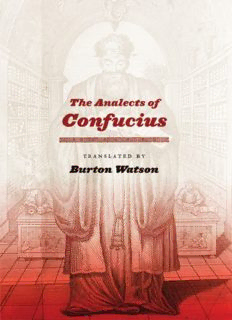
The Analects of Confucius PDF
Preview The Analects of Confucius
The Analects of Confucius TRANSLATIONS FROM THE ASIAN CLASSICS Analects of Confucius, stone stele fragment. Imperial scholars, using a special style of calligraphy called li, inscribed the Analects and other classical texts on stone stele, which they erected in the Imperial Academy in A.D. 175. The stones were destroyed soon after during the wars that brought the dynasty to an end, and the fragments were buried for protection. They were later unearthed during the Song dynasty. This fragment depicts a section of the Analects and measures 52 by 35 centimeters. PHOTOGRAPH AND PERMISSION COURTESY OF THE NATIONAL LIBRARY OF CHINA, BEIJING. The Analects of Confucius TRANSLATED BY BURTON WATSON COLUMBIA UNIVERSITY PRESS NEW YORK COLUMBIA UNIVERSITY PRESS Publishers Since 1893 New York Chichester, West Sussex cup.columbia.edu Copyright © 2007 Columbia University Press All rights reserved E-ISBN 978-0-231-51199-5 Library of Congress Cataloging-in-Publication Data Confucius. [Lun yü. English] The Analects of Confucius / translated by Burton Watson. p. cm.—(Translations from the Asian classics) Includes bibliographical references. ISBN 978-0-231-14164-2 (cloth : alk. paper) ISBN 978-0-231-14165-9 (pbk. : alk. paper) ISBN 978-0-231-51199-5 (electronic) I. Watson, Burton, 1925– II. Title. III. Series. PL2478.L3 2007 181′.112—DC22 2007005401 A Columbia University Press E-book. CUP would be pleased to hear about your reading experience with this e-book at cup- [email protected]. Contents INTRODUCTION Book One Book Two Book Three Book Four Book Five Book Six Book Seven Book Eight Book Nine Book Ten Book Eleven Book Twelve Book Thirteen Book Fourteen Book Fifteen Book Sixteen Book Seventeen Book Eighteen Book Nineteen Book Twenty GLOSSARY OF PERSONS AND PLACES Introduction Lunyu, or The Analects of Confucius, has probably exercised a greater influence on the history and culture of the Chinese people than any other work in the Chinese language. Not only has it shaped the thought and customs of China over many centuries, but it has played a key role in the development of other countries that were within the Chinese cultural sphere, such as Korea, Japan, and, later, Vietnam. Readers encountering the text for the first time might wonder how this rather brief collection of aphorisms and historical anecdotes could have been so influential. The text, probably compiled in stages some time during the fourth century B.C.E., was at first only one of many philosophical works that embodied the teachings of this or that school of early Chinese thought. The followers of the teachings of Confucius were referred to collectively as the Ru school, which denotes persons who devote themselves to learning and the peaceful arts (as opposed to martial matters). Some centuries later, when Emperor Wu (r. 141–87 B.C.E.) of the Han dynasty declared Confucianism the official doctrine of the state, the Analects and other texts associated with Confucius assumed enormous importance. They were regarded as repositories of knowledge of how the empire had been governed in the model eras of antiquity and how the Chinese government system, and society as a whole, should be ordered. In still later centuries, the Analects was treated as a beginning text in the study of classical Chinese, to be committed to memory and, when students were more advanced, studied exhaustively and with its lessons examined in depth.
Description: